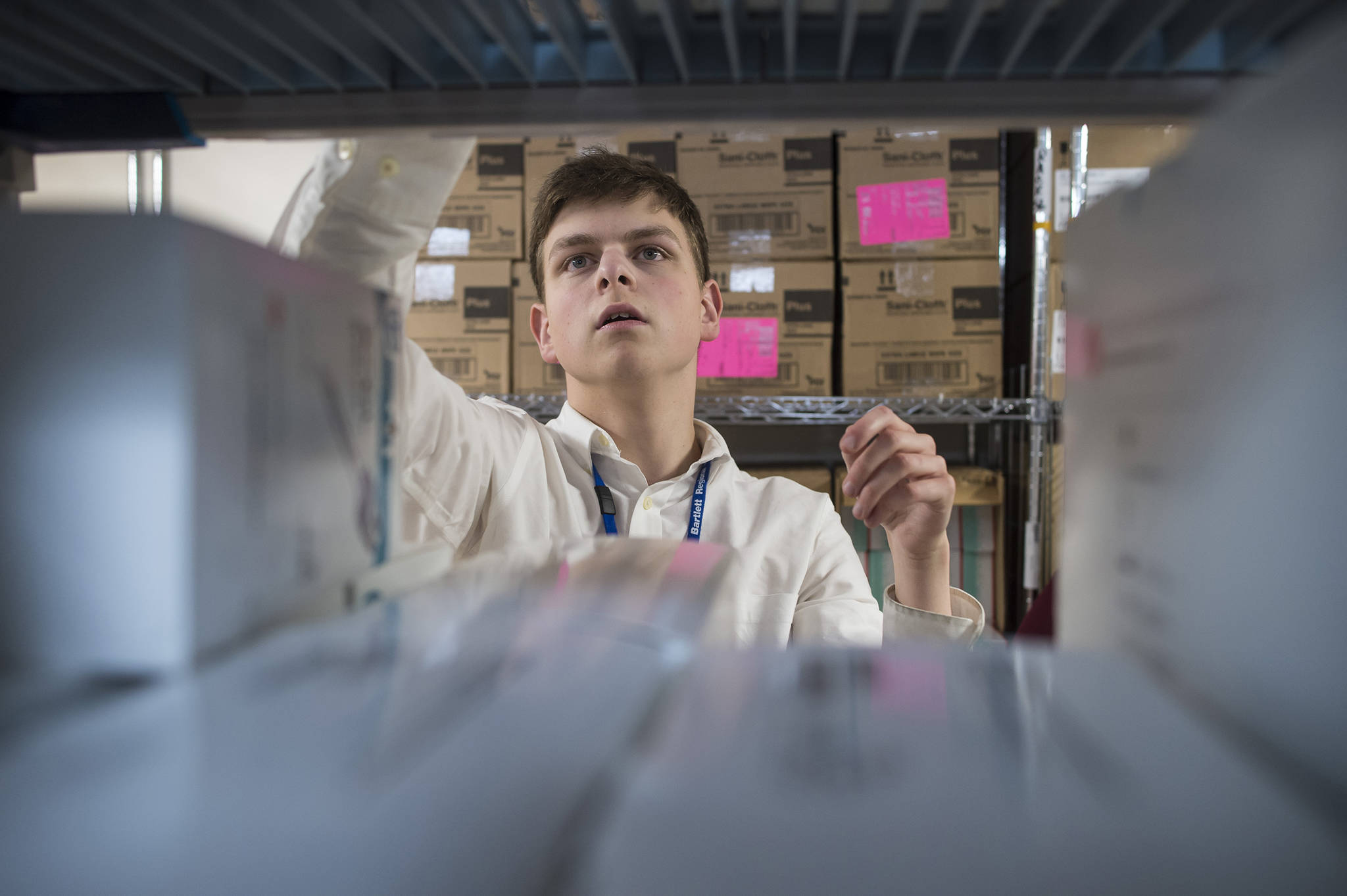>
On a Friday at noon, the maze of hallways, staircases and corridors at Bartlett Regional Hospital is a hive of activity.
Just getting around is tough. But Jasmine Whisenant knows where to go. Whisenant, wearing purple hair in a bun and an orange blouse, works the information desk in the hospital lobby. She’s one of seven interns with Project SEARCH, a new program for young people who experience disabilities which helps train them to compete for employment.
October is National Disability Employment Awareness Month. Navigating work life for many who live with disabilities poses certain challenges, said instructor Meagan Hinton, as it can be difficult for people living with autism, down syndrome and other developmental disabilities to master the professional skills to succeed in a faced-paced work environment, she said.
Project SEARCH aims to teach professionalism, cleanliness and punctuality — what Hinton called soft skills — which help bridge the gap between school and real-world expectations, Hinton said.
“You can learn how to do a job, but having those skills which make you an asset to a company are really what we’re trying to teach our interns,” she said.
People experiencing disabilities can often easily learn a certain job, like bagging groceries, or doing paperwork, Hinton said. But the next step is learning what makes a person employable in general. Those are skills that translate to many work environments.
But those skills are hard to learn if you don’t practice them in the real world, Hinton said. When Whisenant first started working the information desk, for instance, the work required her to speak up more. The 18-year-old high school graduate describes herself as shy, but she’s had to “come out of her shell” at the information desk, she said.
“It feels kind of weird, but OK at the same time,” Whisenant said.
BRH hosts the collaborative program, which is funded largely by a grant through the Alaska Mental Health Trust. The Alaska Department of Labor and Workforce Development, BRH, REACH and the Juneau School District are also sponsors.
During the school year this year, seven interns work 20 hours a week at BRH. Before and after work, they attend a total of 15 hours in classes with Hinton.
They’re currently in the first of three 10-week rotations they’ll work at three different hospital departments.
Sometimes they have a bit of support, but mostly they’re expected to blend in.
Over in the same-day surgery department, Solomon Dunlap, a 22-year-old who experiences down syndrome, has learned quickly the ins and outs of making beds for patients before and after surgery. He stocks the bed stations and replaces the linens.
“At first, I thought if he could do one bed, it would be amazing,” Hinton said.
But Dunlap has exceeded expectations. He’s able to restock seven bed stations a day and replace the linens, disposable socks and hospital gowns without assistance, said Valerie Cables, a para educator with the school district who works with Dunlap.
Solomon doesn’t talk much, but if his wide smile is any indication, he’s happy with the work. When he was in school, he wasn’t the most fastidious classroom helper, Hinton said.
He’s working hard as a member of the six-person team, Cables said.
“I’ll even ask him, do you want to take a break or keep working? And he says keep working,” Cables said.
Down in the materials management office, intern Robert Wilson checks through an inventory of 1,400 different medical devices and supplies.
“More or less, we handle the purchasing for the facility,” said office boss Ethan Sawyer.
Wilson, a 20-year-old who experiences autism, checks expiration dates for products on rows of metal shelves.
He holds up a connection piece to a catheter. It’s past the date. If he didn’t catch it, a doctor or nurse might use it, and it could be faulty equipment.
The task is time-consuming and tedious — it’ll take five or six days, his supervisor Ethan Sawyer said — but he enjoys the attention to detail it requires. Though his disability makes it difficult to hold eye contact, he said, and sometimes he has trouble controlling the tone of his voice, Hinton said, he is particularly good at focusing on small details. It makes him well-suited to the inventory work in the materials division.
“I’ll get through this pretty quickly,” Wilson said.
Sawyer said Wilson has been a self-starter. He learned the ropes in the first few weeks and has needed little direction since then.
“We can kind of pinpoint some stuff from his work that says: hey, why are we throwing away so much product? … This is a very helpful tool,” Sawyer said.
Project SEARCH is funded through this school year, Hinton said. They’re hoping to show the project is a valuable tool for helping Juneau’s young people transition from long careers in school. People with developmental disabilities sometimes start school as early as 3-years-old, and can stay in transition programs to 22.
• Contact reporter Kevin Gullufsen at 523-2228 and kgullufsen@juneauempire.com. Follow him on Twitter at @KevinGullufsen.

